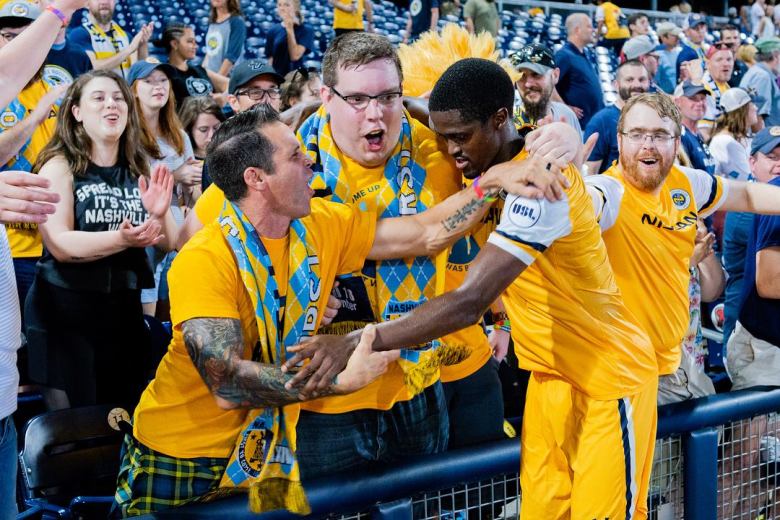
(This website was created to tell the story of the history of soccer in Nashville, and as Nashville Soccer Club has just completed its first season, I’ve decided to use this platform to tell my story of how things went down in the Music City.)
It’s a familiar scene for this writer on this late evening in October. It’s a sense of both frustration and satisfaction. Of both elation and sadness. We have a professional soccer team, but that season has come to an early end. It’s a feeling of accomplishment and also of quiet excitement for what is to come for Nashville Soccer Club.
As the members of this group of fans spill out of a van into the crisp late night air of downtown Nashville, the obligatory hugs and handshakes begin. It’s an awkward moment, the end of a season, especially after sitting with a negative result for several hours. After nine months together, we’re not only literally heading in our own ways, but also in a figurative sense, until things get started again next year. In a lot of ways, it parallels my own experiences getting off the bus with my beloved Ball State men’s basketball team after losing in the season-ending conference tournament. We would unpack, we would say our goodbyes, and for some, we would see them again shortly thereafter. For others, well, who could predict what the future holds.
To me, this is one of the many things that makes being a soccer supporter in America so different from that of other sports in our culture. That’s not to say there aren’t die-hard fans in other sports, but rarely do you see this end-of-season ritual play out for fans in the same way it does for a team, and that’s exactly what is happening, which only serves to make this experience all the more bittersweet.
And what a wonderful experience it was.
—
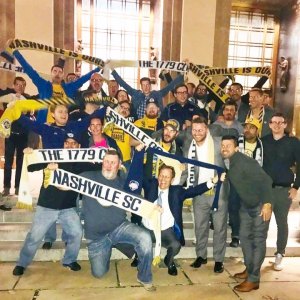
NSC’s ownership group joined in the post-meeting celebrations last November.
For many teams in the USL, the build up to a regular season began in earnest in January and February. For us, it was almost exactly a year ago. This is a unique story. It doesn’t begin with Nashville Soccer Club. It begins with the future of this sport in Nashville, and that’s what makes the year all the more special. Last November, we thought we had developed a strong foundation our team going forward, Tennessee’s first purpose-built professional soccer stadium. It was a night to remember, but in retrospect, it was to become a plot point on an evolving storyline. As we walked out of the Metro Council meeting and into a late fall evening in Nashville, our future seemingly sealed, the mind could only turn to what was next, Major League Soccer.
Nashville, once considered by many a long shot for a berth into the nation’s fastest growing professional sports organization, had now become an odds-on front-runner. Sure enough, in the month following the vote, MLS Commissioner Don Garber made his way to the Music City to confirm Nashville’s invitation to the league. It was December 20, and for me and many others in the Middle Tennessee soccer community, it was the best possible early Christmas present.
A worry lifted from our shoulders, many of us began to look forward to NSC’s inaugural season. It was to be the third-ever professional team in the city, and unlike its predecessors, the appetite for the sport was at an all-time high. The signings were interesting, and eager to build off the buzz of the MLS announcements, the supporters groups began to swell and by the time Atlanta United made it to town on Feb. 10, the excitement of a new season was overwhelming.
In many ways, the excitement wasn’t matched on that cold, rainy day, but following a surprise announcement and reveal of the signature gold shirt, shorts and socks the team would be wearing, the weather and result didn’t seem to matter to the nearly 10,000 fans in attendance. It also served as the introduction of 20-year-old wonder Ropapa Mensah, a Ghana native who will forever live as NSC’s first-ever goalscorer. It was quite an opening salvo.
—
My personal experience of that opening day was certainly a little different than that of the average fan. Having come from a college sports background and already somewhat familiar with some of the team’s administration behind the scenes, I had a role in the press box. On one hand, it was a welcome experience to be helping out doing a job that I loved for many years, but on the other hand, I did miss out on the experience that I had set up for myself with season tickets behind the goal. This internal conflict was ultimately settled by the league, which would be taking care of the stats side of things once play turned over to the regular season. My first time in the stands would come, but I’d have to wait a month for another match day.
Following an eventful preseason that included wins over MLS opponents as well as a dramatic 2-2 draw against burgeoning rival FC Cincinnati, a bus was booked to take supporters up to Louisville for the season-opening contest against our purple rivals to the north. While I was quite happily an independent supporter, this was my first extended time with the Roadies, a non-profit group that had previously supported the fan-owned predecessor to NSC, since a one-off road trip to a match on Vanderbilt’s campus two years ago.
In what would become a trademark for the Roadies going forward, the bus arrived right in the heart of Louisville’s tailgating area, and dozens of gold-clad Tennesseans streamed into the area to share stories and beverages as well as further develop a shared dislike of a certain other USL club.
Much like the Atlanta match, the result didn’t play out the way that anyone on the bus would have liked. A 2-0 loss to the defending league champions, but aside from that, it was a moment in history. The first real match for this new club, and perhaps more importantly for myself, an introduction to the people I’d be spending my next nine months alongside.
The next day, I paid my dues and joined the Roadies.
We would return home for a similarly uninspiring result on the field, a scoreless draw, but the story off the pitch was once again magnificent. Nearly 20,000 fans entered Nissan Stadium that day, making it one of the largest home debuts in league history, but after two matches, this promising first year side had yet to score a goal.
Now, I’d be lying if I said what came next was a completely spontaneous decision, but with my current position with Middle Tennessee State University, I have the ability to take days off a little more regularly than I ever could in my previous life. So driving home from Nissan following that draw, I started to examine the positives and negatives of taking off the last day of the following week to drive to Bethlehem, Pa., to see Nashville’s third match.
An admittedly new fan of the club, it seemed like a crazy idea, and I put it away almost as soon as I thought about doing it. However, as the week began to wind down, the pull of being potentially one of very few Nashville fans to see what could be the team’s first goal and win proved almost gravitational. With the added mix of the match being in Bethlehem, which is perhaps one of the most historically relevant soccer cities in the United States, I couldn’t fight it anymore. I didn’t really tell anyone until I dropped it in a tweet shortly before hitting the road.
The trip was my second of many on the season, and it was perhaps the most special. After making a long-anticipated visit to the former home of the original Bethlehem Steel team, I made my way to a local soccer bar, Golazo House, to swap stories with some of the bartenders, ultimately leaving my mark on the establishment with a Nashville scarf before crawling into bed with high hopes for the ensuing morning.
Having found out that I was the only person from Middle Tennessee to make the trek, I settled in a far corner of the ground with a flag. Nashville’s manager, Gary Smith, made his way over right at kickoff, and I let him know that I needed to see a goal that day. He said he’d make sure of it. A few minutes later, I got my wish. A decidedly dodgy penalty call went our way, and Michael Cox buried it. I don’t totally remember my immediate reaction, but a number of players from the NSC bench ran over to celebrate with me in the corner. I lost my voice almost immediately.
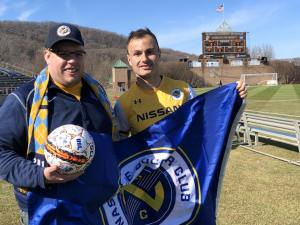
Liam Doyle, back when he still had hair, presented me the match ball in Bethlehem.
After weathering a number of Bethlehem attacks, the match would finish 1-0. I came, I saw, they conquered. As the players were leaving the field, one of them, defender Liam Doyle, walked up and asked if I wanted the game ball. Of course, I wanted it. He went to the locker room and the whole team signed it. It now sits in a place of honor in my office at MTSU, and while I’ll always cherish the ball, it’s the memory I wanted.
In doing the research I’ve done for this website, the thing that stands out most is how little record there is for these matches and memorable moments for a club. As long as I live, I’ll still be one of the only people in the stadium that saw my club’s first victory, and I am going to always take a lot of pride in that.
—
It’s important to remember that while all of this is going on, our stadium fight had started to return to the halls of the Metro Council in Nashville. Just days before that trip to Bethlehem, roughly a dozen of us heeded a last minute call to make our presence felt for a council meeting in which one member, Steve Glover, was attempting to hit the brakes on the previously agreed to parameters. Without getting too much into the details, the push was to take the Fairgrounds, the site identified in the initial deal, off the table and agree to look elsewhere. The tactic was basically to delay the stadium long enough that the MLS team goes away. His efforts failed.
This last-minute call for support from the MLS folks in Nashville proved merely a preview for what was to come. With a mayoral resignation and an impending budget crunch, some members of the council were trying to walk back the commitment made in November. There was a conflict ahead, but for the time being, a lot of us returned our focus to the pitch.
—
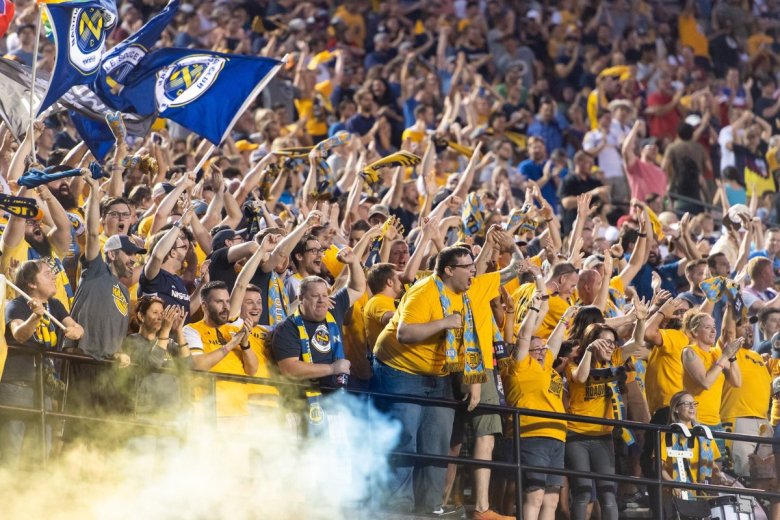
A week after the Bethlehem road trip, Nashville made its way back to the friendly confines of First Tennessee Park to record its first home victory, a 2-0 decision over Charlotte, and it was a win punctuated by Justin Davis downing a can of beer with the team’s supporters. It also marked the continuation of what would become a tradition for the players, both home and away, of greeting their supporters with handshakes, hugs, photos and autographs behind the goal. It was yet another sign of the special relationship this team was developing with its fans.
The positive results would continue to mount for the team as it entered a crowded summer slate, which included a memorable run in the U.S. Open Cup that helped Nashville claim the nation’s longest unbeaten streak for a few incredible weeks. Following wins over Inter Nashville and Mississippi Brilla, the stage was set for a showdown between NSC and the Colorado Rapids of MLS, a match made all the more notable by what it meant for current NSC and former Rapids players Kosuke Kimura and Matt Pickens as well as for former Rapids manager Smith. All three pushed Colorado on to a magical MLS Cup run 2010, which still stands as the only trophy won in the team’s 22-year history.
Truthfully, the MLS side was no match for a hungry Nashville club as the Rapids didn’t place a single shot on target. Mensah, a man in the midst of developing a big goal reputation, iced the game with a 78th-minute strike on his first touch of the match. In a season full of moments, it continues to stand as one of the biggest. Just 11 days later, Mensah would deliver again, scoring a match-winner on the last touch of the game. In a meeting with NSC general manager Court Jeske a week later, he described both as “water cooler” moments for the club around the city of the Nashville. We were building something.
However, as is often the case following a hot first half of a season, the dog days of summer began to wear at NSC’s results, and while there were certainly highs, like another huge crowd for a draw with Cincinnati or Taylor Washington’s late winner over Atlanta, the team entered the fall in need of results to put the expansion club into the playoffs.
—
Results were getting a little worrisome off the pitch too. The stadium fight had reached full bore again as the summer began to die down. Opposition as healthy as it had ever been and boosted by the changing political landscape of the city, we were in for another battle.
Anxious to move forward, the team adjusted its proposal to friendlier terms for the city, and talks continued for a first-of-its-kind community benefits agreement that guaranteed, among other things, a wage floor, affordable housing, daycare and jobs for some of the folks left behind in Nashville’s economic boom. Meanwhile, the opposition, a group that claimed to represent the wishes of the Fairground vendors and current users, organized to fight the team at every stop. It was time to mobilize soccer fans in Nashville once again.
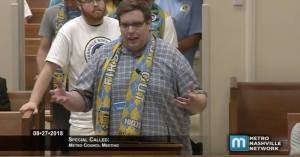
Here I am trying my best to present the case.
The final push would include advocacy for four bills that were in front of the 40-member council, and that began in early August. The magic number was 27. Supporters groups from around the city planned shows of their support over the course of the month-long voting process, beginning with a marathon session in early August that saw us wait until well after 1 a.m. for the first vote. The second reading and a special public hearing would take place two weeks later and see a huge amount of people from Tennessee pledge their support for the stadium.
In addition to the team’s promise to pay for much of the stadium, a key rallying cry for the supporters of the project was soccer’s ability to unite the city in ways that other sports could not. It’s this commitment to diversity that served as a wedge as the meeting wore on. I will openly acknowledge that there were certainly legitimate reasons to oppose the deal, but as the opposition’s speakers wore on, it became more and more apparent that the core of this fight was yet another proxy battle that “Old Nashville” was waging against a younger, and perhaps more diverse, “New Nashville.”
At the end of the night, the argument did not prove convincing.
On Sept. 4, we went to another council meeting. We came out several hours later with a resounding yes. There will be a soccer stadium at the Fairgrounds. Aided in large part by a powerful ownership group, we had let our voices be heard and we changed the future of soccer in Tennessee.
—
Stadium in hand, there was still a season to complete, and following that big win on Nashville’s Public Square, I decided that I couldn’t wait two weeks for the next home game, so I hit the road again. While it wasn’t as historically relevant as that Bethlehem trip, it was nonetheless a memorable one, as I set out for Cary, N.C., to watch the Boys in Gold take on North Carolina.
Both teams firmly on the playoffs bubble, it proved a crucial meeting, and things weren’t going well for the gold side. Once again the only Nashville fan in attendance, I watched the team fall behind by two goals twice before a tremendous late rally tied things up 3-3. The result rocked a North Carolina side desperate for a victory and saw Nashville build some confidence with its highest-scoring road contest of the season. Also, following 90 minutes of yelling, talking to myself and being taken on an emotional rollercoaster, I’m fairly certain that I walked out that stadium with a significant portion of my section thinking I was crazy.
After a season of decidedly inconsistent scoring form, the match propelled NSC to its highest scoring month of the year, and they’d score multiple goals in four of the last five matches to lock up a spot in the playoffs. The last day of the season also brought about another memorable draw as NSC once again battled from behind with regular season champion FC Cincinnati to level things at 3-3 on a Bolu Akinyode shot in the 90th minute.
Including the preseason, it marked the fourth draw for NSC against the league leaders, three of which were sealed with goals inside the last five minutes of the match. A day later, Nashville’s playoff fate was determined. They were going back to Cincy.
—
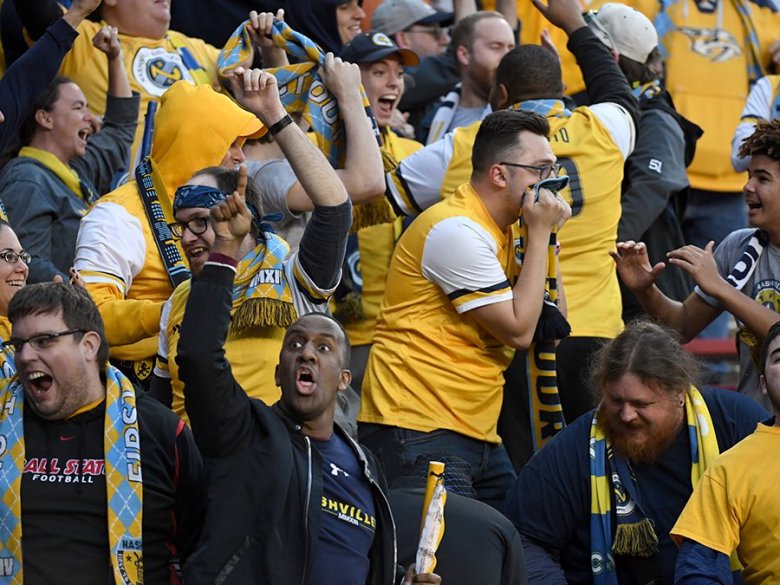
That day in Cincinnati is perhaps worth a 3,000-word retrospective of its own. Of course we were playing Cincy. At times pitted against each other in the fight for MLS expansion, there was a bitterness that underscored interactions between supporters of the two clubs for over a year. Separated by less than five hours and with the two largest fanbases in the USL’s Eastern Conference, that would boil over at times, not just between fans, but on the pitch as well. And all that was perhaps made more frustrating by the fact that neither team could beat the other.
However, a lot of the longstanding bitterness had worn away by the time it got to match day. Cincy, now with a stadium and MLS confirmation of its own, had become a more welcoming atmosphere for Nashville fans and there was a sense of mutual respect. Save a few notable exceptions, the Roadies were treated like guests of honor at both Nippert Stadium and the pre-game bar of choice for The Pride, Top Cat’s.
The match? An instant classic. Once again, both teams piled on the chances, but neither pulled ahead. After 90 minutes, we were still deadlocked. A Cincy goal that seem destined to be the breakthrough early in the first extra time period was wiped out once again by an arcing deflected shot from Bradley Bourgeois, this time just five minutes from the final whistle. The scene among the Nashville supporters was pandemonium. Five matches played, five matches drawn.
And so this would be settled from the penalty spot. One team was going home heartbroken, the other elated. For Cincy, it meant advancing to the second round of the playoffs for the first time ever. For Nashville, it meant not only eliminating their chief rival over the course of the season, but then making them wait until 2020 for a chance to exact revenge. Both sides made all five of their first spot kicks because, after all, it wouldn’t be Nashville/Cincy if we didn’t go to sudden death. Justin Davis, a fan favorite from day one, missed his kick. Cincinnati did not waste the opportunity. The season was over.
Just like they had following every match, Nashville’s Boys in Gold made their trek to the supporters, and together they both mourned the immediate end of the season and celebrated what they had accomplished. The last to enter the area, Davis, was welcomed warmly into the arms of fans, and they continued to sing his name as he left for the locker room.
“We love you, Justin! We do! Oh Justin, we love you!”
The season was important. The wins were important. But truthfully, the real story was always what was happening off the pitch. This team and its fans had fallen for each other, and no single moment from that match was going to wipe that away.
The future remains bright in Nashville. In fact, one might even say it’s golden.